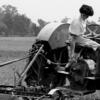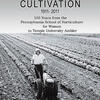A Century of Cultivation
Providing an equally comprehensive, but decidedly more portable, vision of Ambler’s first 100 years is the companion book A Century of Cultivation 1911 to 2011 — 100 Years from the Pennsylvania School of Horticulture for Women to Temple University Ambler, written by Jenny Rose Carey, former Director of the Ambler Arboretum of Temple University, and Mary Anne Blair Fry, a graduate of the Class of 1958. The book and artifacts collection were developed with the assistance of the Temple University Ambler “100-Year Club,” a group of dedicated alums Temple Ambler Head Librarian Sandi Thompson, according to Carey. You may find the book in the Ambler Campus Library.
“The book is full of fantastic original material from the campus archives and images that have not been published before,” said Carey. “Our goal is to share this history with as many people as possible — we hope that people will read this and provide further artifacts and memories for the collection and future editions of the book. Coupled with the artifacts collection, the book presents a rich vision of our history, how things changed while the focus remains on practicality — using what you have learned to improve and enrich yourself while also enriching your community.”
According to Fry, collecting memories is an essential part of preserving campus history.
“I have been ‘attached’ to this campus for 55 of its 100 years; intrigued and amazed by the stories of the lives and careers of my fellow graduates. Oral tradition is great, but our history was in danger of being lost as our older graduates were no longer with us and without a written record their stories would be forgotten,” wrote Fry in the foreword for A Century of Cultivation. “Using the inspiration from Temple University’s founder, Dr. Russell Conwell, and his book Acres of Diamond, I gathered stories of outstanding graduates — our gems. The more I read and researched, the more difficult it became to choose the ‘Diamonds of the Decades,’ for we have so many that could be recognized.”
A Campus in Transition
Mary Anne Fry has a nearly unique distinction at Temple University. She is one of just eight people to ever graduate from Temple with a degree in Agriculture.
As a member of the Class of 1958, she attended the Temple University Ambler Campus at a time of great transition. When she began her classes, she was attending the Pennsylvania School of Horticulture for Women. When she graduated, however, her degree read “Ambler Junior College,” which soon after became the “Ambler Campus of Temple University.”
“I always felt I was in the middle of the seesaw,” she said with a laugh. “I was among the last of the ‘Aggies,’ and being an Aggie, I was assistant to the herdswoman. The campus was a very different place then; we had a herd of Jersey cows, hogs, chickens, sheep, and horses. We tended to the peach and apple orchards and field crops such as corn and wheat with the horticulture students. It was a fully working farm — we worked hard throughout the day and we loved every moment of it.”
The wonderful thing about the programs at Ambler, said Fry, was that “everything was hands-on — you had to go out and actually do it.”
“You were never just in the classroom,” she said. “One of the greatest benefits was being out in the gardens, out in the fields, out in the barn actually doing what you were learning about.”
Lowe said it is her hope that the new book and the artifacts collection will “excite further research into the history of the campus and the Woman’s National Farm and Garden Association, which was established on campus in 1914.”
“I think anyone who has graduated from the Ambler Campus should feel a great sense of pride for having been a part of its 100-year history. So many wonderful leaders came out of Ambler and its programs,” she said. “From the very beginning, Ambler’s students have been forward thinkers concerned about their communities, the nation, and truly the world and the generations that would follow them — they were studying and applying ‘green’ initiatives before anyone recognized the importance of doing so. The Woman’s Land Army trained 20,000 ‘farmerettes’ to work the land and provide food for U.S. and European citizens and troops — this effort prevented the starvation of thousands of European families during the War. Our students were at the forefront of initiatives like this, leaders in every sense of the word.”
The Seeds of Education
The seeds that would one day become Temple University Ambler were sown in the most unlikely setting back in 1905.
Jane Bowne Haines, a graduate from Bryn Mawr College, had taken a tour of Europe, visiting several colleges of gardening in England and Germany. When she returned to the states, she was determined to create a similar institution here.
It was in 1910 that Haines, then 41, who had inherited a love of horticulture from her Quaker family, came across the 71-acre McAlonan farm in Ambler during a horse and buggy ride. With financial support from friends, in particular fellow graduates from Bryn Mawr, she purchased the property and founded the Pennsylvania School of Horticulture for Women in 1911 — the only school of its type at the time in the United States.
“Believing thoroughly in the principle of horticultural training for women, and that the time for founding such an institution is now come, a number of people have associated themselves together with the purpose of opening, in the near future, a school for the practical training of women in gardening and kindred subjects. The purpose of the school is to offer educated and earnest minded women who have a love for the country life and an aptitude for country pursuits, practical training in horticulture,” Haines said in a speech to her friends and backers in 1910. “The first students in the school will have much of the fun, for to them will be given an insight into the foundation of things; the laying out and planting of the gardens and grounds, and the creating of custom and precedent so dear to all schools and colleges. One principle above all others we will keep before us and would particularly enforce — the trained hand with the trained mind, which means mastery and success.”
Classes began on February 11, 1911, with Mary D. Collins serving as principal and Miss E.D. Varley as the only instructor. Of the five students who first enrolled, three completed the two-year program.
Learning by Doing
Haines had a “hands-on, learning-by-doing” philosophy clearly evidenced by the instruction the earliest students received at the time. Orchard care, farm tool use, lawn and shrubbery care, care of livestock, botany, chemistry, vegetable and kitchen gardening, bee keeping, poultry raising, carpentry, and agricultural bookkeeping all fell under the blanket term of “horticultural instruction.”
Classes were held from 7:30 a.m. to 4 p.m., five days a week, 10 months out of the year. And the students had a hand in everything, including some finishing carpentry work in the first greenhouses in 1912. The three women who stuck it out waited until 1915 for official commencement ceremonies to be held, the first of tens of thousands of students who would call the campus home in the following century.
“After studying our history I think you develop a greater appreciation for how much that history has shaped what we do today. If the founding of the Pennsylvania School of Horticulture for Women had not happened there would be no Landscape Architecture program at Temple, no Horticulture, no Community and Regional Planning,” said Carey. “From the first day, practical learning went hand-and-hand with book learning and that continues on campus today.”
Seeking Social Reform
The Pennsylvania School of Horticulture for Women and the Woman’s National Farm and Garden Association were established at a point in history “when women were organizing into groups for the first time,” she said.
“This was a period before women had the right to vote — essentially they weren’t full citizens — but they wanted to make a difference in their communities,” Carey said. “For the first time they realized that by joining forces they could make more of a difference. Basically they were trying to change the world — if women were running things, how would they do things differently.”
The rise of these “exceptionally organized” groups and institutions, Carey said, “was in part a thirst for knowledge for themselves, though it was also about passing on that knowledge to others.”
“Jane Bowne Haines was a social reformer at a time when there wasn’t very much available for women. She felt that horticulture and agriculture would be considered socially acceptable jobs for young, educated women and that it could provide them with a better future,” she said. “The garden clubs were involved in civic beautification and conservation decades before it ever became buzzwords. They looked at the world in terms of what we were doing to it — cutting down trees, spoiling the waterways — and what we could do to make it better. We have their foresight to thank for many of the green spaces, the open space, and arboreta that we enjoy in the Philadelphia region today that otherwise may never have been preserved.”
For more information about A Century of Cultivation, the Hilda Justice Artifacts Collection or to schedule a tour of the gardens and the collection, contact 267-468-8001.



